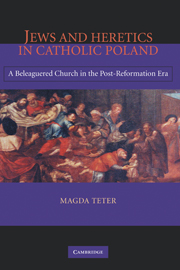Book contents
- Frontmatter
- Contents
- List of Illustrations
- Preface and Acknowledgments
- Note on Terms, Spelling, and Translations
- Abbreviations
- JEWS AND HERETICS IN CATHOLIC POLAND
- Introduction
- 1 “One Mystical Body … Only One Shepherd”: The Church Ideals of Social Order
- 2 The Upset Social Order: Nobles and the Jews in Poland
- 3 Heresy and the Fleeting “Triumph of the Counter-Reformation”
- 4 “Bad and Cruel Catholics”: Christian Sins and Social Intimacies Between Jews and Christians
- 5 “A Shameful Offence”: The Nobles and Their Jews
- 6 “Countless Books Against Common Faith”: Catholic Insularity and Anti-Jewish Polemic
- 7 “Warding Off Heretical Depravity”: “Whom Does the Catholic Church Reject, Condemn and Curse?”
- Conclusion: Did the Counter-Reformation Triumph in Poland?
- Glossary
- Notes
- Selected Bibliography
- Index
4 - “Bad and Cruel Catholics”: Christian Sins and Social Intimacies Between Jews and Christians
Published online by Cambridge University Press: 12 January 2010
- Frontmatter
- Contents
- List of Illustrations
- Preface and Acknowledgments
- Note on Terms, Spelling, and Translations
- Abbreviations
- JEWS AND HERETICS IN CATHOLIC POLAND
- Introduction
- 1 “One Mystical Body … Only One Shepherd”: The Church Ideals of Social Order
- 2 The Upset Social Order: Nobles and the Jews in Poland
- 3 Heresy and the Fleeting “Triumph of the Counter-Reformation”
- 4 “Bad and Cruel Catholics”: Christian Sins and Social Intimacies Between Jews and Christians
- 5 “A Shameful Offence”: The Nobles and Their Jews
- 6 “Countless Books Against Common Faith”: Catholic Insularity and Anti-Jewish Polemic
- 7 “Warding Off Heretical Depravity”: “Whom Does the Catholic Church Reject, Condemn and Curse?”
- Conclusion: Did the Counter-Reformation Triumph in Poland?
- Glossary
- Notes
- Selected Bibliography
- Index
Summary
An eighteenth-century anonymous preacher lamented in his sermon on “human ingratitude” for the Thursday preceding Easter that “our Savior Jesus” suffered now from “bad and cruel Catholics” just as he had suffered from “malicious Jews” and “heretics”:
And so I have been preaching about human ingratitude. And how much more I could say about the horrible ingratitude that our Savior Jesus had experienced in the Most Dear Sacrament, and continues to experience in our times, and is bound to experience until the end of times because of the cruel faithlessness of people who don't believe. Not once was He tortured in the Most Holy Hosts by malicious Jews. Not once was He thrown out of the pyx and trampled, or thrown into fire by blind heretics robbing holy Catholic churches. And not once, was He secretly stolen and desecrated by people possessed by the Devil. And … how much humiliation does he suffer from believing, but bad and cruel, Catholics!
The Catholic clergy's frustration with its loss of influence went beyond their frustration with those in power. Many ordinary Catholics, too, ignored the teachings of the Church. The sins and religious ignorance of those the preacher called “bad and cruel Catholics” exposed how far the Church was from its ideal. The Church felt beset on all sides by “malicious Jews,” “blind heretics,” and disobedient Catholics themselves.
- Type
- Chapter
- Information
- Jews and Heretics in Catholic PolandA Beleaguered Church in the Post-Reformation Era, pp. 59 - 79Publisher: Cambridge University PressPrint publication year: 2005



